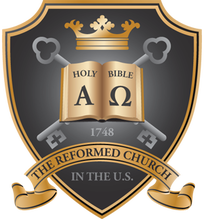Beliefs > Denominations > German Reformed Church
German Reformed Church
Originally the German Reformed Church, the Reformed Church in the United States (RCUS) was organized in 1725 thanks mainly to the efforts of John Philip Boehm, who immigrated to the United States in 1720 and organized the first congregation of German Reformed believers near Philadelphia. Later, other ministers like George Weiss and Michael Schlatter would join him. Boehm was eventually ordained by the Classis of Amsterdam, which oversaw the American branch of the Dutch Reformed Church (now the Reformed Church in America) in 1729. The German Reformed would remain under Dutch Reformed oversight until 1793 when the German Reformed adopted their own constitution. In the 1740s, Count Nicolaus von Zinzendorf, bishop of the Moravian Church, visited Pennsylvania, hoping to unite the German Lutherans and Reformed with the Moravians, which Boehm staunchly resisted.
The 19th century saw controversy as the German Reformed Church debated issues such as revivalism, especially the Mercersburg Theology of John Nevin and Philip Schaff. Other controversies, such as debates over liturgy, also occurred in the 19th century. The second half of the century also saw the formation of their first General Synod, held in 1863, and, in the 1870s and 1880s, there were attempts, albeit unsuccessful, to unite with the Dutch Reformed Church.
The twentieth century saw the RCUS increasingly move toward ecumenism and higher criticism of the Bible. Some who were more conservative in their theology united to form the Eureka Classis of the RCUS to continue classical Reformed worship and polity. The RCUS merged with the Evangelical Synod of North America (ESNA) in 1934 to form the Evangelical and Reformed Church. This group was a mix of Lutheran and Reformed theology.
A portion of the RCUS known as the Eureka Classis resisted the merger, objecting to the ESNA's admixture of Lutheran teachings with Calvinist practices; most of its churches and members descended from late 19th-century immigration either from parts of Germany where Reformed confessionalism had taken hold or from the Volga River region of Russia, who were ethnically German and isolated from liberalizing influences in the motherland. By contrast, most RCUS churches, classes, and synods farther east had significantly assimilated into generalized American Protestantism, with decidedly ecumenical leanings. The Evangelical and Reformed Church later merged with the Congregational Christian Churches (a merger of Congregational and Restorationist churches) in 1957 to become the United Church of Christ, a body noted for its strongly liberal doctrine and moral stances.
The 19th century saw controversy as the German Reformed Church debated issues such as revivalism, especially the Mercersburg Theology of John Nevin and Philip Schaff. Other controversies, such as debates over liturgy, also occurred in the 19th century. The second half of the century also saw the formation of their first General Synod, held in 1863, and, in the 1870s and 1880s, there were attempts, albeit unsuccessful, to unite with the Dutch Reformed Church.
The twentieth century saw the RCUS increasingly move toward ecumenism and higher criticism of the Bible. Some who were more conservative in their theology united to form the Eureka Classis of the RCUS to continue classical Reformed worship and polity. The RCUS merged with the Evangelical Synod of North America (ESNA) in 1934 to form the Evangelical and Reformed Church. This group was a mix of Lutheran and Reformed theology.
A portion of the RCUS known as the Eureka Classis resisted the merger, objecting to the ESNA's admixture of Lutheran teachings with Calvinist practices; most of its churches and members descended from late 19th-century immigration either from parts of Germany where Reformed confessionalism had taken hold or from the Volga River region of Russia, who were ethnically German and isolated from liberalizing influences in the motherland. By contrast, most RCUS churches, classes, and synods farther east had significantly assimilated into generalized American Protestantism, with decidedly ecumenical leanings. The Evangelical and Reformed Church later merged with the Congregational Christian Churches (a merger of Congregational and Restorationist churches) in 1957 to become the United Church of Christ, a body noted for its strongly liberal doctrine and moral stances.
Sources
Wikipedia
Last updated October 22, 2023
